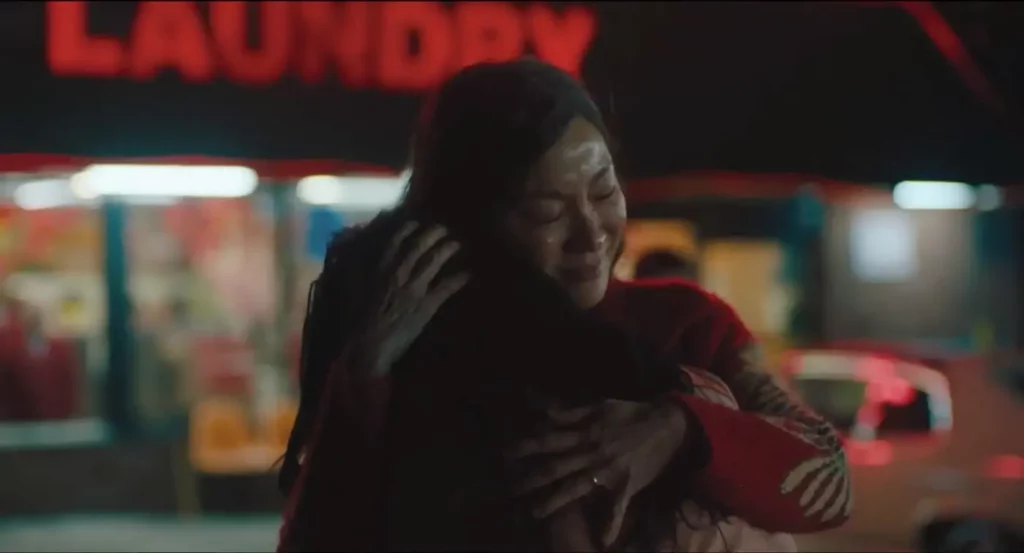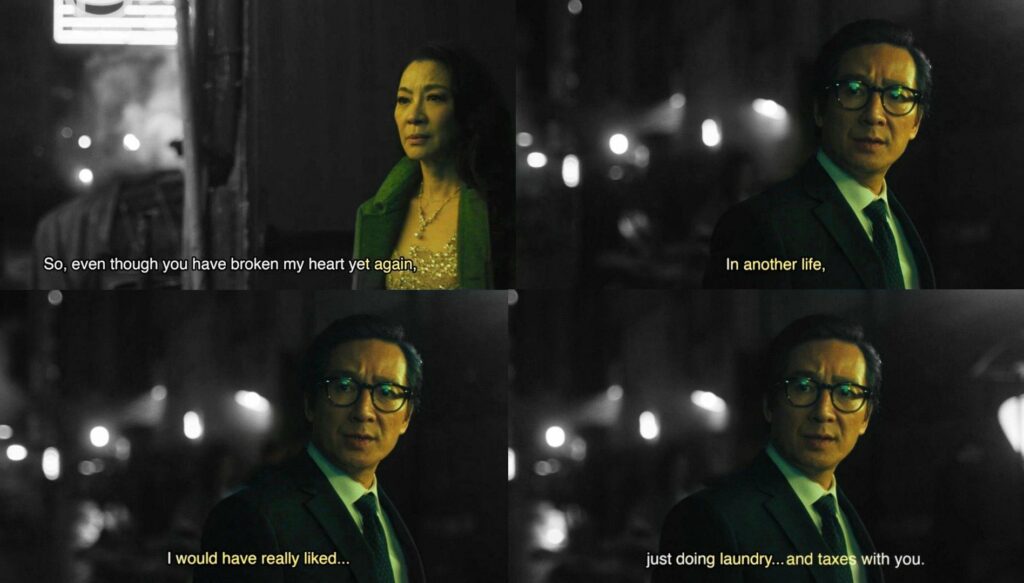Note: This review contains spoilers for Everything Everywhere All at Once (2022).

Released in March last year, Everything Everywhere All At Once (abbreviated as EEAAO) follows the struggles of a Chinese-American family with sci-fi elements entwined in the myriad of alternate realities that protagonist Evelyn Quan Wang must face. Within this film, Evelyn is startled by a strange intrusion upon her life as she is given a bluetooth headpiece and is designated to fight an all-knowing entity, Jobu Tupaki (who so happens to be her own daughter, Joy), and her soul-sucking “everything bagel” through different universes of evil auditors, sausage fingers, and talking raccoons.
At the start of the movie, we are immersed into the humdrum of a busy home as receipts and unkempt bags fill every corner of the house. Evelyn, an overworked mother, must juggle the burden of a struggling laundromat business and caring for her father, Gong Gong, and the stress and tension over these responsibilities causes her to mentally withdraw from the people around her. Her husband Waymond, depicted as timid and much more laid-back, struggles to propose a divorce while her daughter, Joy, battles with the pressure of dealing with her mother. As the two grapple for Evelyn’s attention, she is wrapped within her own world, depicted as the archetypal “strict asian mother” overshadowing her passive husband and progressive daughter.
One theme that was present throughout the movie was family relationships: valued in Chinese households yet not always demonstrated explicitly in favor of guarded strictness. This contrasts with Western households where the value of family is (stereotypically) less prominent as the children age, though open displays of affection are ever-present and the standards that parents uphold are much lower. Joy, the daughter of an immigrant family, is caught between both worlds: Evelyn’s seemingly unattainable expectations and disregard for her sexuality in the face of Gong Gong causing her to grow distant and behave carelessly.
When first given the bluetooth headpiece, we breeze through a timeline of Evelyn’s life. It becomes apparent that she was once this same daughter: reckless enough to abandon her family for a man she loved, and now bearing the consequences of her rash decision. As we venture into alternatives to Evelyn’s life—singer, movie star and chef, among others—we observe the sheer contrast between the opulence and thrill of those what if’s and the mundanity of her own reality. Instead of the flash of paparazzi crowding her vision, it is the tedious task of taxes that drains the color from her face; the reason for her lack of day-to-day presence mentally and refusal to acknowledge sentiment or care from her loved ones.
From the beginning of the film, we see that the relationships between mother and daughter and husband and wife are already on the verge of collapse. Joy hurries to drive away from the havoc of her family before Evelyn runs up to her and for a minute, the audience is fooled to think that what comes next will be a kind and reassuring gesture, before Evelyn calls her fat and urges her to eat healthier: a backhanded expression of concern that further hurts and isolates Joy, fueling her resentment towards her mother. Evelyn deems Waymond’s happy-go-lucky behavior as impractical, and when he presents her with divorce papers after much hesitation, she struggles to understand why as she believes their marriage was a lifetime promise. As the pair goes to settle taxes at the IRS, Waymond’s focus on a loving old couple highlights his own wants for the future though Evelyn is unable to reciprocate such honeymoon love.
In the plethora of universes that Evelyn is soon pushed into, a pattern begins to emerge: choices, and their life-altering effects. Her choice to start a new life with Waymond against the wishes of her father, and how regret had begun to pool at the dawning realization that this was not the life she had imagined: her more successful and fulfilled counterparts in the multiverse, serving only to feed this regret. In one universe where she arises as a renowned actress for her talent in kung-fu, we meet Waymond again, this time in a melancholic scene reminiscent of Wong Kar-wai. Here, he conveys his deeply rooted feelings, having been casted away for too long. His last words before walking away echo to her: “In another life, I would have really liked just doing laundry and taxes with you.” Even though the life they share is meddled with money and work, all Waymond really sought was to feel Evelyn’s forgotten love once again, and to regain the spark they had kindled together. But by then, it was too late.

As the film progresses, Evelyn must fight off Jobu Tupaki, her denial of Jobu’s identity as Joy, and the deathly bagel that Jobu has rendered. Similar to a black hole, this bagel is a fusion of everything: grade reports, scrambled receipts, seasoning, hopes, and dreams. Circling in mid-air, it presents the truth to Joy: nothing matters. It is a representation of anxiety, melancholy, happiness and fear, every emotion, experience and sensation spread elegantly like cream cheese—bundled as one and degraded to nothing but a speck of sand. To Evelyn, this concept is absurd: her entire life has revolved around the stacks of receipts to be sorted and chores to be completed, and she is at first incapable of comprehending the sheer vastness of reality beyond the minute occurrences within her family and laundromat. Jobu Tupaki, however, sees the bagel as salvation: claiming that it is the only way for her to escape her problems and her mother to find peace.
Towards the end of the movie, Jobu Tupaki (or Joy) is pulled away from the bagel by her family: saved as her mother, father and grandfather hold onto her for dear life and resist the pull of the bagel, empowered by the hope of resurrecting their withered relationship. And though Evelyn still faces the same issues with her laundromat and taxes, she gains a newfound affection and appreciation for the people she loves after the dilemma is over: understanding that where she is unable to escape the life she has now as a result of her past choices, she can instead start by adopting a different perspective on life and amending her fractured relationships—beginning anew all the same.
To me, EEAAO incorporates sci-fi action to portray the often harsh reality of a Chinese immigrant household. It proves that, after each grapple or conflict, no matter how small or infinitely large, there will always be time to amend whatever complications that run deep and reset life with old wounds. From the mirror vision of a simple, joyous life in the opening scene being only an illusion or flashback as we shift to Evelyn’s rambling over a Chinese New Year party and Waymond’s commitment to the divorce, to a similar scene at the same table still scattered with taxes and folders, the entire family present and working together to build a new life together bit by bit at the end, we come to see the change in Evelyn’s attitude towards life—her acceptance of mundanity, made worthwhile by the prioritizing of family.